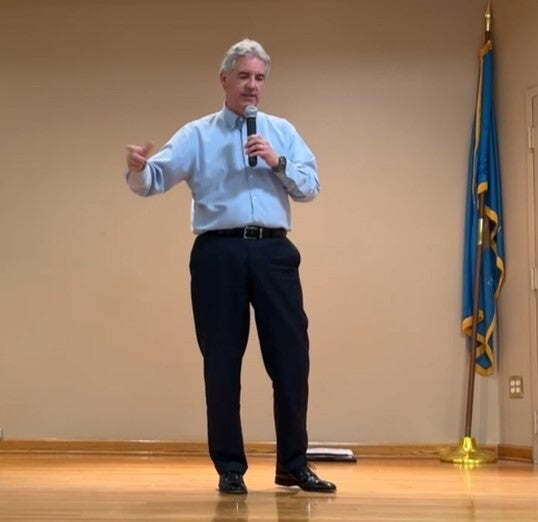Collins echoed that sentiment.
“You really want to drive from here to Florida, you’re going to have to charge 15 to 20 times, wait 45 minutes each time?” Collins commented. “They’re trying to take away our ability to travel.”
One woman, who was not identified, said of Garvin that “no one voted for this guy” and suggested he “has a God complex” for trying to force regulation on residents over their objections.
Delaware agencies like DNREC have the authority to create regulations to enforce laws like this, which is included in the federal Clean Air Act.
Michelle Peters of Milford said residents must come together to persuade Garvin and his boss Carney to withdraw the proposal and, if they lose that fight, to take it to court.
“Our goal is to dissuade the governor from imposing a product that Delawareans need to buy,” Peters said. “The strategy must be to awaken citizens against the mandate.”
Bruce Smith of Millsboro told the audience that he owns a Tesla electric vehicle and offered a ride to anyone, but opposes the proposal. “I’m here because I’m sick and tired of mandates,” Smith said.
In an interview, Republican state Sen. Dave Lawson of Harrington, Kent County, said the mandate is pure political excess.
“What bothers me about all of this is that they’re shoving it down our throats. You’re going to do this,” Lawson said, “Wait a minute. We’re a favored country. We have freedoms. If you don’t want any, you shouldn’t be forced. And I think that’s it. It really sticks with people.”
“This leads us to be up to date with where the market is going”
Gov. Carney’s office referred requests for comment to DNREC, and Garvin would not agree to an interview.
Garvn appeared at some of the GOP town halls, including one last week at the Mill Creek Fire Company near Elsmere. Although the agency he leads has proposed the regulation, Garvin stressed that no final decision has been made.
“The process that we’re doing right now is being evaluated,” Garvin told the audience. “The state has not made a decision on the program. We are in the process of evaluating it.”
Garvin told attendees that electric car makers are not currently sending vehicles to Delaware dealers, but would begin to do so if the state adopts the California standard.

He also noted that many manufacturers, including General Motors, have said they would only make electric cars by 2035, so Delaware would just follow suit.
“So the issue right now in Delaware is that manufacturers have an obligation to provide a certain amount of vehicles to states that have adopted this program,” Garvin said. “We have not adopted the program, so there is no incentive for them to make these cars available to dealers in the state of Delaware.”
Garvin said the mandate, if passed, would “step up” for a decade to give Delaware time to prepare and that the state has at least $15 million to spend on charging stations and other aspects of the ” electric transport infrastructure”.
The goal is “to make sure that the infrastructure is in place in the state as the cars are coming in so that we can manage it and maintain it,” he said.
The gradual integration of electric cars into the Delaware market also “allows our dealers, allows our mechanics, allows others to migrate to the new market that’s coming. If we wait until the car companies say, guess what, electric vehicles are all you can get, we’ll be way behind the curve. This keeps us abreast of where the market is going.”


